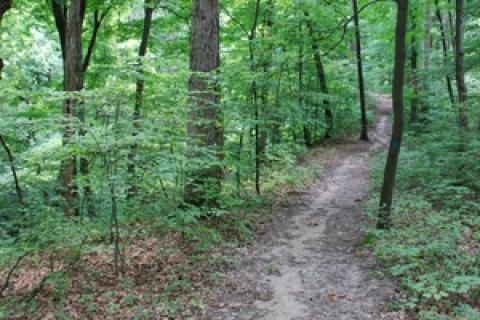
 Maneuvering along a hiking trail and "in the zone" with the natural surroundings can be quickly interrupted by a small piece of trash left by humans. Such a little piece of evidence of irresponsibility has a big impact, not only for the next person to pass by on the trail but also a long lasting effect on the wild and wildlife that dwell there. When I spot an empty power bar wrapper or sports drink bottle lying trailside, I hope that the drop was an accident and occurred while attempting to slide the item back into the backpack while walking — but likely not so.
Maneuvering along a hiking trail and "in the zone" with the natural surroundings can be quickly interrupted by a small piece of trash left by humans. Such a little piece of evidence of irresponsibility has a big impact, not only for the next person to pass by on the trail but also a long lasting effect on the wild and wildlife that dwell there. When I spot an empty power bar wrapper or sports drink bottle lying trailside, I hope that the drop was an accident and occurred while attempting to slide the item back into the backpack while walking — but likely not so.
It's often said that one bad apple's act spoils the entire harvest. That is true in the hiking community, but more often than not, avid trail users are also devoted to nature conservation. So, those who spy a piece of trash should simply pick it up and pack it out. That is an easy, self-imposed act of ethics on each hiker's part. Picking up another's trail trash (known as "negative trace") is one of several ways to manage trash on the trail. Following are a few additional techniques to keep trails trash free.
Preplanning of gear use and food menus reduces the most trail trash possibilities. When planning a trail meal, whether a simple lunch for a day hike or meals to sustain a two-day backpack trip, consider what trash, if any, will result from the menu. Buying trail foods in bulk and dividing meals and toting them in zipper lock plastic bags keep food fresh and offer very little trash. While hiking in bear country, always keep food packaging, storage and trash management in mind a safety concern. Try to eat right out of the bag (or cooking pot) if possible, which eliminates the need for a plate or bowl.
If overnighting, and if an open campfire is permitted, an option exists for burning small food wrappers, as long as the ashes are contained in the fire ring and not allowed to float into surrounding vegetation as a fire hazard. If the wrapper doesn't burn completely, pack the remnant out. Burying trash in a fire ring, or anywhere along a trail, is not a wise move. Wildlife will locate the trash and dig it up, causing several bad deals — one being scattered trash and another is a spot for soil erosion. Also, some food wrappers can become a life-ending noose for wildlife or an obstruction of the digestive system.
If you know trash will be created on your next trail adventure, and you prefer to pack it out, be sure to pack a small trash bag. Another option is to use a reusable, waterproof storage bag for keeping trash odor at a minimum and leak free. Simply wash the bag out when back home, dry it completely, and return to your pack to ensure you don't leave it behind on the next trip. Spread the word to others — leave no trace.
- 1635 views

